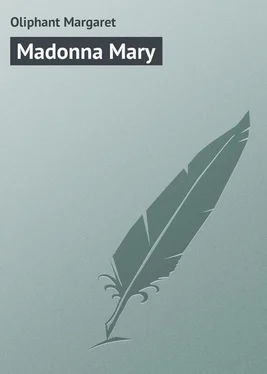Margaret Oliphant - Madonna Mary
Здесь есть возможность читать онлайн «Margaret Oliphant - Madonna Mary» — ознакомительный отрывок электронной книги совершенно бесплатно, а после прочтения отрывка купить полную версию. В некоторых случаях можно слушать аудио, скачать через торрент в формате fb2 и присутствует краткое содержание. Жанр: foreign_prose, на английском языке. Описание произведения, (предисловие) а так же отзывы посетителей доступны на портале библиотеки ЛибКат.
- Название:Madonna Mary
- Автор:
- Жанр:
- Год:неизвестен
- ISBN:нет данных
- Рейтинг книги:4 / 5. Голосов: 1
-
Избранное:Добавить в избранное
- Отзывы:
-
Ваша оценка:
- 80
- 1
- 2
- 3
- 4
- 5
Madonna Mary: краткое содержание, описание и аннотация
Предлагаем к чтению аннотацию, описание, краткое содержание или предисловие (зависит от того, что написал сам автор книги «Madonna Mary»). Если вы не нашли необходимую информацию о книге — напишите в комментариях, мы постараемся отыскать её.
Madonna Mary — читать онлайн ознакомительный отрывок
Ниже представлен текст книги, разбитый по страницам. Система сохранения места последней прочитанной страницы, позволяет с удобством читать онлайн бесплатно книгу «Madonna Mary», без необходимости каждый раз заново искать на чём Вы остановились. Поставьте закладку, и сможете в любой момент перейти на страницу, на которой закончили чтение.
Интервал:
Закладка:
So that was all Mr. Sorbette could do in the case; and a wonderfully puzzled doctor he was as he went back to his quarters, and took the first opportunity of telling his sister that she was all wrong about the Ochterlonys, and he always knew she was. “As if a man could know anything about it,” Miss Sorbette said. And in the meantime the Major went home, and was very tender of Mary, and petted and watched over her as if she had had a real illness. Though, after all, the question why she had let him do so, was often nearly on his lips, as it was always in his heart.
CHAPTER VIII
WHAT Mrs. Ochterlony had to do after this was to write to Aunt Agatha, settling everything about little Hugh, which was by no means an easy thing to do, especially since the matter had been complicated by that most unnecessary suggestion about Islay, which Mrs. Hesketh had thought proper to make; as if she, who had a grown-up daughter to be her companion, and swarms of children, so many as almost to pass the bounds of possible recollection, could know anything about how it felt to send off one’s entire family, leaving only a baby behind; but then that is so often the way with those well-off people, who have never had anything happen to them. Mary had to write that if all was well, and they could find “an opportunity,” probably Hugh would be sent by the next mail but one; for she succeeded in persuading herself and the Major that sooner than that it would be impossible to have his things ready. “You do not say anything about Islay, my dear,” said the Major, when he read the letter, “and you must see that for the child’s sake – ”
“Oh, Hugh, what difference can it make?” said Mrs. Ochterlony, with conscious sophistry. “If she can take one child, she can take two. It is not like a man – ” But whether it was Islay or Aunt Agatha who was not like a man, Mary did not explain; and she went on with her preparations with a desperate trust in circumstances, such as women are often driven to. Something might happen to preserve to her yet for a little while longer her three-year-old boy. Hugh was past hoping for, but it seemed to her now that she would accept with gratitude, as a mitigated calamity, the separation from one which had seemed so terrible to her at first. As for the Major, he adhered to the idea with a tenacity unusual to him. He even came, and superintended her at the work-table, and asked continually, How about Islay? if all these things were for Hugh? – which was a question that called forth all the power of sophistry and equivocation which Mrs. Ochterlony possessed to answer. But still she put a certain trust in circumstances that something might still happen to save Islay – and indeed something did happen, though far, very far, from being as Mary wished.
The Major in the meantime had done his best to shake himself free from the alarm and dismay indirectly produced in his mind by his brother’s letter. He had gone to Mr. Churchill after all, but found it impracticable to get the entry blotted out of the register, notwithstanding his assurance that it was simply a matter of form. Mr. Churchill had no doubt on that point, but he could not alter the record, though he condoled with the sufferer. “I cannot think how you all could let me do it,” the Major said. “A man may be excused for taking the alarm, if he is persuaded that his wife will get into trouble when he is gone, for want of a formality; but how all of you, with cool heads and no excitement to take away your judgment – ”
“Who persuaded you?” said the clergyman, with a little dismay.
“Well, you know Kirkman said things looked very bad in Scotland when the marriage lines were lost. How could I tell? he is Scotch, and he ought to know. And then to think of Mary in trouble, and perhaps losing her little provision if anything happened to me. It was enough to make a man do anything foolish; but how all of you who know better should have let me do it – ”
“My dear Major,” said Mr. Churchill mildly, “I don’t think you are a man to be kept from doing anything when your heart is set upon it; – and then you were in such a hurry – ”
“Ah, yes,” said Major Ochterlony with a deep sigh; “and nobody, that I can remember, ever suggested to me to wait a little. That’s what it is, Churchill; to have so many friends, and not one among them who would take the trouble to tell a man he was wrong.”
“Major Ochterlony,” said the clergyman, a little stiffly, “you forget that I said everything I could say to convince you. Of course I did not know all the circumstances – but I hope I shall always have courage enough, when I think so, to tell any man he is in the wrong.”
“My dear fellow, I did not mean you,” said the Major, with another sigh; and perhaps it was with a similar statement that the conversation always concluded when Major Ochterlony confided to any special individual of his daily associates, this general condemnation of his friends, of which he made as little a secret as he had made of his re-marriage. The station knew as well after that, that Major Ochterlony was greatly disturbed about the “unusual step” he had taken, and was afraid it might be bad for little Hugh’s future prospects, as it had been aware beforehand of the wonderful event itself. And naturally there was a great deal of discussion on the subject. There were some people who contented themselves with thinking, like the doctor, that Ochterlony was an ass with his fidgets; while there were others who thought he was “deep,” and was trying, as they said, to do away with the bad impression. The former class were men, and the latter were women; but it was by no means all the women who thought so. Not to speak of the younger class, like poor little Mrs. Askell, there were at least two of the most important voices at the station which did not declare themselves. Mrs. Kirkman shook her head, and hoped that however it turned out it might be for all their good, and above all might convince Mary of the error of her ways; and Mrs. Hesketh thought everybody made a great deal too much fuss about it, and begged the public in general to let the Ochterlonys alone. But the fact was, that so far as the ordinary members of society were concerned, the Major’s new agitation revived the gossip that had nearly died out, and set it all afloat again. It had been dying away under the mingled influences of time, and the non-action of the leading ladies, and Mrs. Ochterlony’s serene demeanour, which forbade the idea of evil. But when it was thus started again the second time, it was less likely to be made an end of. Mary, however, was as unconscious of the renewed commotion as if she had been a thousand miles away. The bitterness had gone out of her heart, and she had half begun to think as the Major did, that he was an injured man, and that it was her fault and his friends’ fault; and then she was occupied with something still more important, and could not go back to the old pain, from which she had suffered enough. Thus it was with her in those troubled, but yet, as she afterwards thought, happy days; when she was very miserable sometimes and very glad – when she had a great deal, as people said, to put up with, a great deal to forgive, and many a thing of which she did not herself approve, to excuse and justify to others. This was her condition, and she had at the same time before her the dreadful probability of separation from both of her children, the certainty of a separation, and a long, dangerous voyage for one of them, and sat and worked to this end day after day, with a sense of what at the moment seemed exquisite wretchedness. But yet, thinking over it afterwards, and looking back upon it, it seemed to Mary as if those were happy days.
The time was coming very near when Hugh (as Mrs. Ochterlony said), or the children (as the Major was accustomed to say) were going home; when all at once, without any preparation, very startling news came to the station. One of the little local rebellions that are always taking place in India had broken out somewhere, and a strong detachment of the regiment was to be sent immediately to quell it. Major Ochterlony came home that day a little excited by the news, and still more by the certainty that it was he who must take the command. He was excited because he was a soldier at heart, and liked, kind man as he was, to see something doing; and because active service was more hopeful, and exhilarating, and profitable, than reposing at the station, where there was no danger, and very little to do. “I don’t venture to hope that the rogues will show fight,” he said cheerfully; “so there is no need to be anxious, Mary; and you can keep the boys with you till I come back – that is only fair,” he said, in his exultation. As for Mary, the announcement took all the colour out of her cheeks, and drove both Hugh and Islay out of her mind. He had seen service enough, it is true, since they were married, to habituate her to that sort of thing; and she had made, on the whole, a very good soldier’s wife, bearing her anxiety in silence, and keeping a brave front to the world. But perhaps Mr. Sorbette was right when he thought her nerves were upset. So many things all coming together may have been too much for her. When she heard of this she broke down altogether, and felt a cold thrill of terror go through her from her head to her heart, or from her heart to her head, which perhaps would be the most just expression; but she dared not say a word to her husband to deter or discourage him. When he saw the two tears that sprang into her eyes, and the sudden paleness that came over her face, he kissed her, all flushed and smiling as he was, and said: “Now, don’t be silly, Mary. Don’t forget you are a soldier’s wife.” There was not a touch of despondency or foreboding about him; and what could she say who knew, had there been ever so much foreboding, that his duty was the thing to be thought of, and not anybody’s feelings? Her cheek did not regain its colour all that day, but she kept it to herself, and forgot even about little Hugh’s reprieve. The children were dear, but their father was dearer, or at least so it seemed at that moment. Perhaps if the lives of the little ones had been threatened, the Major’s expedition might have bulked smaller – for the heart can hold only one overwhelming emotion at a time. But the affair was urgent, and Mary did not have very much time left to her to think of it. Almost before she had realized what it was, the drums had beat, and the brisk music of the band – that music that people called exhilarating – had roused all the station, and the measured march of the men had sounded past, as if they were all treading upon her heart. The Major kissed his little boys in their beds, for it was, to be sure, unnaturally early, as everything is in India; and he had made his wife promise to go and lie down, and take care of herself, when he was gone. “Have the baby, and don’t think any more of me than you can help, and take care of my boys. We shall be back sooner than you want us,” the Major had said, as he took tender leave of his “bonnie Mary.” And for her part, she stood as long as she could see them, with her two white lips pressed tight together, waving her hand to her soldier till he was gone out of sight. And then she obeyed him, and lay down and covered her head, and sobbed to herself in the growing light, as the big blazing sun began to touch the horizon. She was sick with pain and terror, and she could not tell why. She had watched him go away before, and had hailed him coming back again, and had known him in hotter conflict than this could be, and wounded, and yet he had taken no great harm. But all that did her little good now; perhaps because her nerves were weaker than usual, from the repeated shocks she had had to bear.
Читать дальшеИнтервал:
Закладка:
Похожие книги на «Madonna Mary»
Представляем Вашему вниманию похожие книги на «Madonna Mary» списком для выбора. Мы отобрали схожую по названию и смыслу литературу в надежде предоставить читателям больше вариантов отыскать новые, интересные, ещё непрочитанные произведения.
Обсуждение, отзывы о книге «Madonna Mary» и просто собственные мнения читателей. Оставьте ваши комментарии, напишите, что Вы думаете о произведении, его смысле или главных героях. Укажите что конкретно понравилось, а что нет, и почему Вы так считаете.












